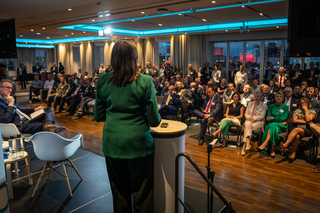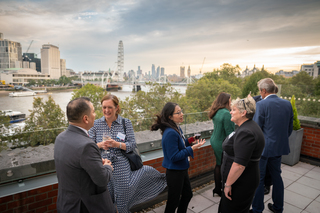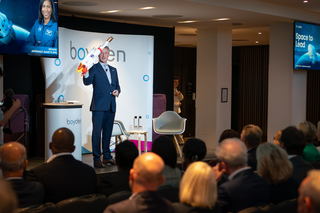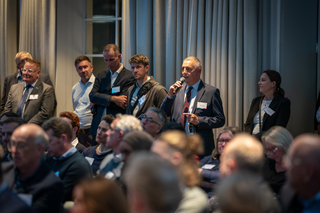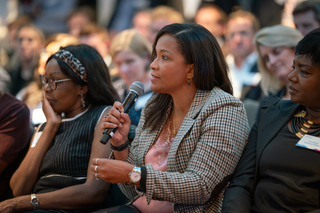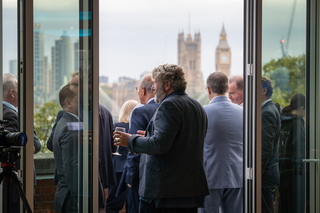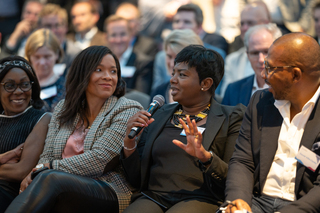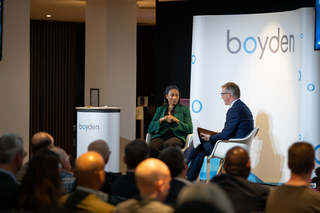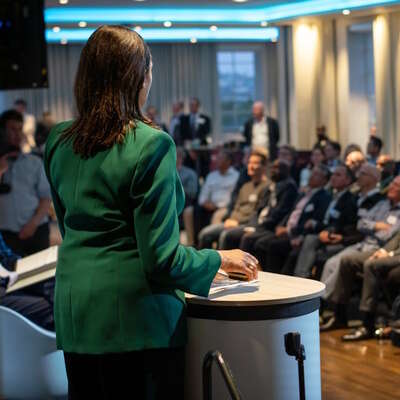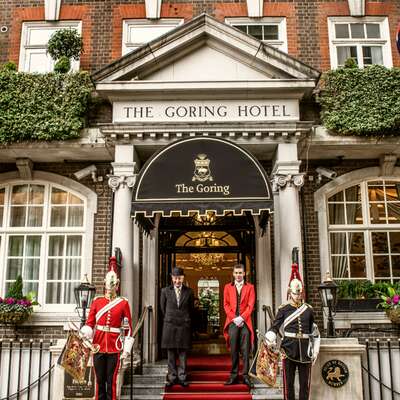Boyden London’s annual assembly September 2023 shares in the explorer mindset of an astronaut and how space exploration will enable us one day to live beyond the earth’s protective atmosphere
As Boyden clients, friends and colleagues contemplated 16 sunrises and sunsets a day, travelling through space at 17,500 miles an hour and team collaboration in high threat environments, special guest, astronaut Jeanette Epps gently brought them down to earth. Her humility, her special brand of leadership and the sheer magnitude of her achievements added to the galactic atmosphere in the room.
Space to lead. Space to dream.
This was the mid-week treat for more than 200 Boyden guests and global colleagues, inspired by a trailblazer in scientific discovery; one of seven children, daughter of an intrepid mother who taught them: ‘You can learn anything, you have to put the time and effort in’.
In Jeanette’s early career, she took her masters in physics, aerospace & engineering to Ford Motor Company to show her supervisor, “everything I learned in grad school I could take anywhere and be successful”. Following that, when working as a project engineer and tech ops officer at the CIA, she discovered her explorer mindset, volunteering to go to Iraq in the hunt for weapons of mass destruction.
Taking that mindset further, rigorous training led to graduate astronaut candidacy, gaining eligibility to live on the international space station (ISS). That dream becomes a reality in February 2024, when as part of Dragon Crew Jeanette goes to the ISS.
In a fireside chat led by Nick Robeson, Managing Partner of hosts Boyden UK & Ireland, Jeanette highlighted the power of trust in relationships. From ensuring the survival of a colleague on the end of a robotic arm in space, to flying together in a T38 supersonic jet – top gun for astronauts.
In these high threat environments, Jeanette explains, “a key part of our learning is to become comfortable with being a little bit uncomfortable,” describing scenarios involving a suit weighting over 140 kg worn under water for six hours, to being enclosed in a mask, harness and helmet, to the ‘birth-like’ capsule that delivered astronaut Frank Rubio to earth the day of the event.
‘Being a little bit uncomfortable’ understates the extreme training Jeanette completed; supersonic flight, extra-vehicular activity skills (space-walk), robotics, expeditionary and field medical training and, with one third of the ISS being Russian, language immersion in Moscow.
What happens on the ISS?
The ISS is an orbiting laboratory, the size of an American football field with a mass approximate to 320 cars. 2023 is the silver anniversary of the launch of the initial segment.
Jeanette describes what the crew will do, 400 km above earth. “We will conduct a lot of experiments, primarily to figure out how to get the human body to live outside earth’s protection, develop new materials, find different ways to live in space and how to conduct life on the surface of the moon; everything we are doing in low-earth orbit is to get us further and further from earth’s surface. We are also doing a lot of field geology for the moon to discover what happened to it, what impacted it, why it is so cratered, so maybe we can stop it happening again in future.”
Teamwork and diversity are critical to success. “Teamwork is a huge topic that astronauts work on constantly. How do we understand each other, how self-aware are we?”
“We do analogue training to simulate, as a six-man crew, how we operate and perform together in a small environment. The majority of the environments we operate in are hybrid, like living under water at 50 ft. This is called a NEEMO event – Nasa extreme environment mission operations. We lived under water for nine days, practising what we would do if we went to an asteroid; how we would exploit it, take core samples, figure out if we could even walk on it. This is a major event that we normally do every year”.
Crews are diverse in terms of nationality, skills, experience and training. “I’ve been asked ‘what’s it like to be the only female on the team?’. In a mission like this, in a high threat environment, you have to focus on the mission, so I constantly tell young ladies that I am a crew member, not a female. I’m crew: there is a mission at hand”.
Jeanette’s style of leadership is captivating. Her self-leadership, humility and collaborative leadership are remarkable. So too, is her leadership as a role model. An advocate for STEM and the application of learning, Jeanette inspires not just business but school audiences too.
With these audiences, she shares how she has handled adversity in her career. “In any situation when things aren’t going your way, it’s much better to be proactive. Being reactive will only cause regrets, be proactive, understand what is happening. In not going to space in 2018, I had so many friends who gathered around me and helped me in how to proceed. Keeping a cool head and being methodical in how you go forward has really helped me”.
Other parallels with the business world include return on investment. Nick Robeson asked, “Why do we invest so much money in trying to understand the world outside planet earth?
Jeanette points to all the technologies and therapies we have on earth that have come from space exploration. “Having a space programme generates jobs, interest in science which helps spawn more technologies. On orbit we investigated bisphosphonates to help with the impact on bones, that now helps people on earth with osteoporosis. There’s also GPS, comms systems, satellites systems – so many technologies we developed for space, going to the moon and Mars, we use every day on earth. That’s the return on investment. And who knows how far the exploration mindset can take us.”
In summing up the event, Kevin Keegan, Partner, Boyden Ireland highlighted Jeanette’s family values around learning, education and doing something bigger than yourself, the importance of the explorer mindset and focusing on the mission.
“A transformational chief executive told me that they look for people in the management or leadership team who are not about themselves, but are about the mission. Leadership is not about the big team you lead; it’s about the influence you can have on the people around you. We see how much Jeanette gives and advocates for; she is doing something that is about much more than her and as leaders in a different sphere, that’s something invaluable we can all think about.”
